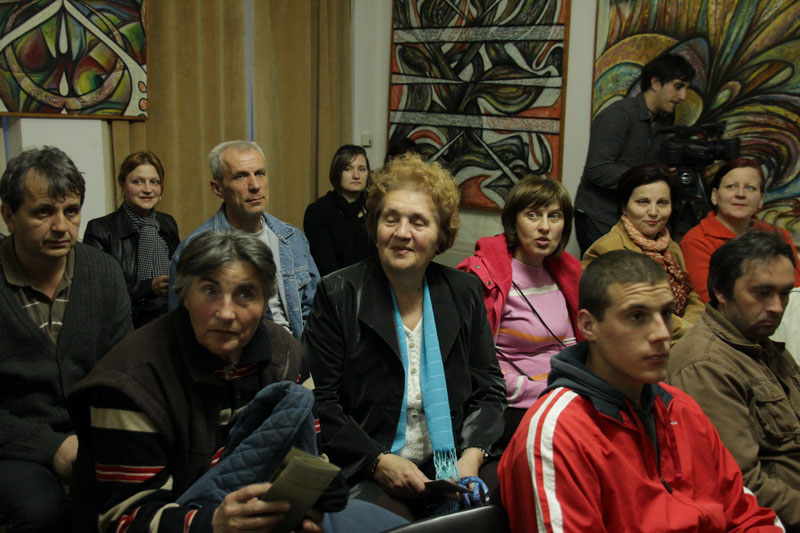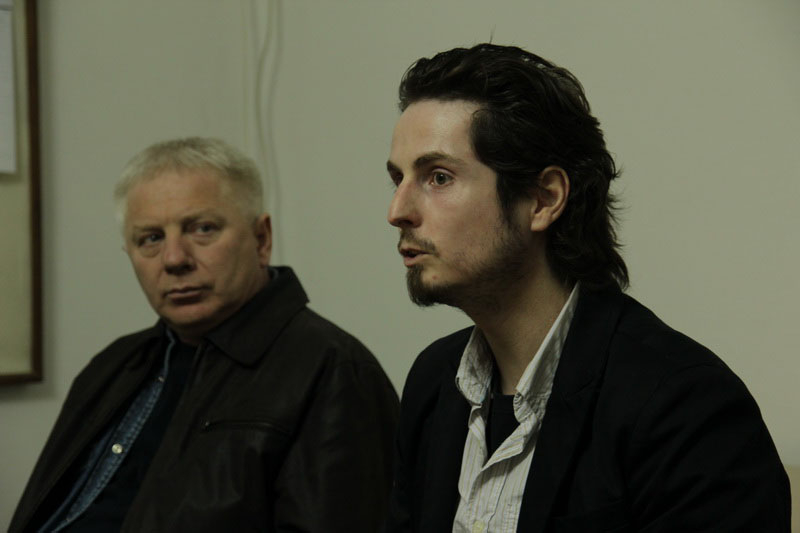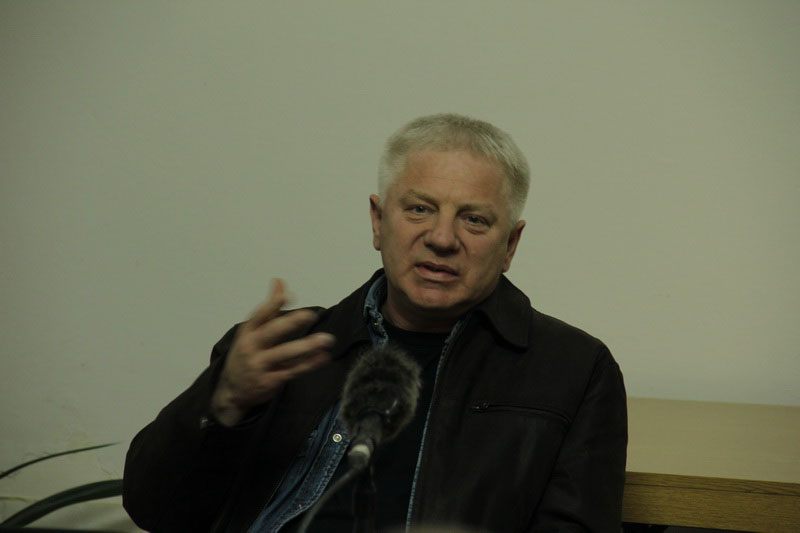“Ohne Tabuisierung kein Balkankrieg” – Fünfte Station der Film-Tour in Lovcenac (27. 3. 2012)
Nach der Veranstaltung in Bad Radkersburg (Steiermark/Österreich) am 21. März 2012 – erstmals wurde der Film dort in der neuen Version mit deutschen Untertiteln gezeigt – fand der fünfte Termin der Film-Tour “Die Donauschwaben” (Danube Swabians/Podunavske Svabe) am 27. März 2012 wieder in der Vojvodina statt: in der Bibliothek von Lovcenac, das zur Gemeinde Mali Idos (ungarisch: Kishegyes) gehört und im Norden der Batschka liegt.
Moderatorin der Veranstaltung war Aleksandra Vučinić, Professorin für serbische Sprach- und Literaturwissenschaft, Gesprächspartner von Regisseur Marko Cvejic war Politikwissenschaftler Pavel Domonji.
“Dies ist die dunkle Seite; etwas, das in der offiziellen Geschichtsschreibung nicht vorkommt. Der Film ist hart und muss gezeigt werden”, erklärte Domonji, ehe er auf die Frage der Kollektivschuld zu sprechen kam und dabei auf ein Problem an diesem Konzept hinwies: “Man ist schuld, weil man zu einer Gemeinschaft gehört. Aber man kann nicht die Konsequenzen für etwas tragen, an dem man nicht beteiligt war.”
Laut Pavel Domonji würde die Diskussion um Restitution und Kriegsverbrechen panische Züge annehmen. Manche Leute hätten Angst, sie würden gezwungen, ihre Heimat zu verlassen. “Den meisten Deutschen geht es lediglich um eine moralische Wiedergutmachung. Sie benötigen nur Anerkennung, keinen wirtschaftlichen Gewinn. Für sie ist es eine Frage der Gerechtigkeit. Leider vermisst man in Serbien den Willen, sich mit der Vergangenheit auseinanderzusetzen”, bedauerte der Politikwissenschaftler.
Ein Zuhörer aus dem Publikum sagte: “Die Wahrheit wurde die ganze Zeit unter den Teppich gekehrt. Heute sind keine offiziellen Mandatsträger der Stadt oder der lokalen Gemeinschaft anwesend und das ist gruselig, denn hier handelt es sich um eine gesellschaftspolitische Angelegenheit, die sie interessieren sollte. Wir sprechen jetzt über eine Sache, die vor 60 Jahren geschah! Die 90er (gemeint sind die Balkankriege in den 1990er Jahren, Anm. DKS) wären nicht passiert, wenn wir mit unserer Vergangenheit im Reinen gewesen wären.”

Engagierte Diskussionsteilnehmer in den Räumen der Bibliothek von Lovcenac - Foto: Visnja Cupic Jovanovic
Die DVD “Die Donauschwaben” (Danube Swabians/Podunavske Svabe) mit deutschen Untertiteln ist ab sofort über das Donauschwäbische Zentralmuseum in Ulm zu bestellen. Die Kontaktdaten lauten:
Donauschwäbisches Zentralmuseum
Schillerstraße 1
D-89077 Ulm
Tel: +49 731 – 96 254 - 0
Fax: +49 731 – 96 254 - 200
ePost: info@dzm-museum.de
Internetseite: www.dzm-museum.de
Mehr zum Film “Die Donauschwaben” (Danube Swabians/Podunavske Svabe) und zur Film-Tour unter:
Die gesammelten Meldungen zu Marko Cvejics Film “Die Donauschwaben
Weitere Informationen über die offizielle Internetseite der serbischen Filmproduktionsfirma:
www.mandragorafilm.com

Politikwissenschaftler Pavel Domonji (links) und Regisseur Marko Cvejic - Foto: Visnja Cupic Jovanovic
Juče je u prostorijama Narodne biblioteke u Lovćencu, održana projekcija filma “Podunavske Švabe”, i nakon toga javna debata u kojoj je većina posetilaca aktivno učestvovala.
Moderatorka skupa bila je Aleksandra Vučinić, profesorka srpskog jezika i književnosti, i lokalni partner projekta “Podunavske Švabe – turneja”, a govornici su bili Pavel Domonji, politikolog i Marko Cvejić, reditelj.
“Ovo je tamna strana Meseca, nešto čega nema u zvaničnoj istoriografiji. Film je težak i treba ga pokazivati, pokreće dva važna pitanja. Prvo je pitanje kolektivne krivice. Postoje dva problema sa tim konceptom, krivi ste zato što pripadate određenom kolektivitetu, a ne možete snositi posledice za nešto što nije vaš problem, u čemu niste učestvovali. Drugi problem je transgeneracijska krivica, prenosi se sa generacije na generaciju. Ovde se postavlja pitanje suočavanja sa prošlošću. Ono ne može da promeni prošlost, može samo da podigne svest, tako da sledeći put možemo da prepoznamo problem” - dao je svoj utisak o filmu Pavel Domonji.
Jedan od učesnika naglasio je sledeće: “Istina se stalno gura pod tepih. Danas ovde nema predstavnika opštine i mesne zajednice, što je strašno, jer je ovo društveno političko pitanje, i trebalo bi da ih se tiče. Mi tek sad pričamo o tome što se desilo pre 60 godina! Ne bi se 90-te desile da smo raščistili s prošlošću.”
Na komentar da film previše naivno i idealistički prikazuje Evropu, reditelj je naglasio da mu to nije bila namera, već pre svega, da se učini jedan civilizacijski iskorak, Evropa je naglašena upravo zbog te mogućnosti interakcije sa drugim ljudima, upoznavanjem različitih sadržaja i njene multikulturalnosti, što najviše fali razvoju našeg društva.
Pavel Domonji je, u odgovoru na pitanje učesnika o restituciji i povraćaju imovine Nemcima, i u vezi sa tim, pitanjem ratnih zločinaca, rekao da postoji moralna panika u vezi sa tim da će ljudi biti isterani iz svojih kuća. “Većini Nemaca je stalo do moralnog obeštećenja, potrebno im je samo priznanje, a ne ekonomska korist. To je za njih pitanje pravde. U Srbiji, na žalost, nema spremnosti da se suoči sa svojom prošlošću.”
Tijana Rolović
PR, Mandragora film

Politikwissenschaftler Pavel Domonji: “Der Film ist hart und muss gezeigt werden.” - Foto: Visnja Cupic Jovanovic
At 27th march 2012, at the premises of the National Library in Lovćenac, the projection of the film “Danube Swabians” and then the public debate in which most visitors actively participated, were held.
The moderator was Aleksandra Vučinić, a professor of Serbian language and literature and the local partner of the “Danube Swabians - screening tour,” and speakers were Pavel Domonji, political scientist and Marko Cvejić, director.
“This is the dark side of moon, something that doesn’t exist in the official historiography.
The film is heavy and it has to be showed. It runs two important questions: first is the question of collective guilt. There are two problems with this concept, you are guilty because you belong to a collectivity, but you cannot bear the consequences for something that is not your problem, in which you didn’t participated. Second problem is the trans generational guilt; it’s passed from generation to generation. Here we ask the question of dealing with the past. It cannot change the past, it can only raise awareness, so that next time we can recognize the problem”, Pavel Domonji gave his impression of the film.
One participant of the debate from the audience said: “The truth is constantly being pushed under the carpet.
There are no representatives of the municipality and the local community today, which is scary because this is a socio political issue, and they should be concerned about it.
We are now talking about what happened 60 years ago!
90’s wouldn’t happen if we clear up with the past.”
On the comment that the film is showing Europe in too naive and idealistic way, the director said that it was not his intention, but, above all, to do one civilizational step. Europe was highlighted because of the ability to interact with other people, meeting various contents and it’s multiculturalism, which we miss the most in our society’s development.
Responding to the question of restitution and war crimes, Pavel Domonji said that there is a moral panic about it. People are afraid that they will be forced to move from their homes.
“Most Germans care only about the moral compensation, they need only recognition, not economic gain.
It is a question of justice for them.
In Serbia, unfortunately, there is no willingness to confront with the past.”
Tijana Rolović
PR, Mandragora film
